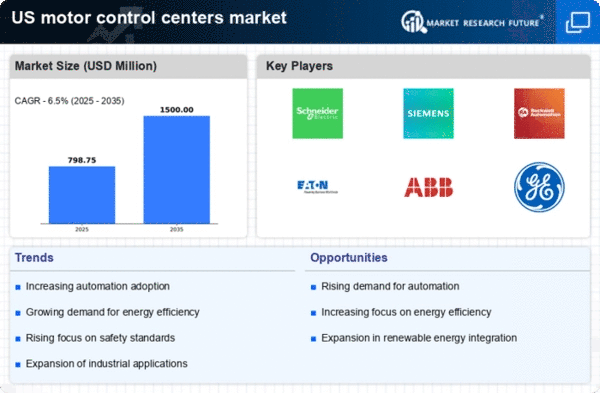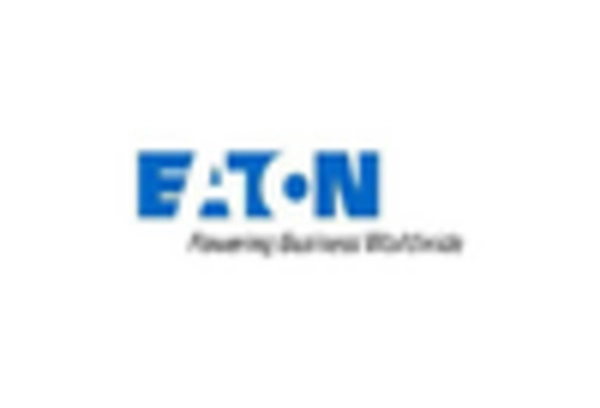Rising Demand for Automation
The motor control-centers market is experiencing a notable surge in demand for automation across various industries. As manufacturers seek to enhance operational efficiency and reduce labor costs, the integration of automated systems becomes increasingly vital. This trend is particularly evident in sectors such as manufacturing, oil and gas, and utilities, where the need for precise control and monitoring of machinery is paramount. According to recent data, the automation market in the US is projected to grow at a CAGR of approximately 10% over the next five years, which directly influences the motor control-centers market. The adoption of advanced motor control technologies is likely to facilitate smoother operations and improve productivity, thereby driving growth in the motor control-centers market.
Growth in Infrastructure Development
The ongoing growth in infrastructure development across the US is significantly influencing the motor control-centers market. As new construction projects emerge, particularly in transportation, utilities, and industrial facilities, the demand for efficient motor control solutions is expected to rise. Motor control-centers are essential for managing electrical systems in these infrastructures, ensuring optimal performance and energy efficiency. The US government has allocated substantial funding for infrastructure projects, with an estimated $1 trillion earmarked for improvements over the next decade. This investment is likely to create a favorable environment for the motor control-centers market, as companies seek to implement advanced control solutions to support the expanding infrastructure needs.
Expansion of Renewable Energy Sources
The shift towards renewable energy sources is significantly impacting the motor control-centers market. As the US aims to increase its reliance on renewable energy, the demand for efficient motor control solutions in wind, solar, and hydroelectric power generation is on the rise. Motor control-centers play a crucial role in managing the operation of various renewable energy systems, ensuring optimal performance and reliability. The US Department of Energy has reported that renewable energy accounted for approximately 20% of the total electricity generation in 2023, a figure that is expected to rise. This transition not only supports environmental goals but also creates opportunities for innovation within the motor control-centers market, as new technologies are developed to meet the specific needs of renewable energy applications.
Increased Focus on Safety and Reliability
Safety and reliability remain paramount concerns in the motor control-centers market, particularly in industries such as manufacturing and energy. The need for robust safety measures and reliable operation is driving the adoption of advanced motor control technologies. Regulatory bodies in the US are continuously updating safety standards, which compels manufacturers to invest in compliant motor control solutions. The market is witnessing a shift towards systems that not only meet but exceed these safety requirements. As a result, companies are increasingly prioritizing the integration of safety features into their motor control-centers. This focus on safety is expected to contribute to a market growth rate of approximately 6% over the next few years, as organizations seek to mitigate risks and enhance operational reliability.
Technological Advancements in Control Systems
Technological advancements in control systems are reshaping the landscape of the motor control-centers market. Innovations such as digital control systems, IoT integration, and advanced software solutions are enhancing the capabilities of motor control-centers. These technologies enable real-time monitoring, predictive maintenance, and improved energy management, which are essential for modern industrial applications. The US market is witnessing a shift towards more sophisticated control systems, with a projected growth rate of around 8% annually. This evolution not only improves operational efficiency but also reduces downtime and maintenance costs, making it a key driver for the motor control-centers market. As industries increasingly adopt these advanced technologies, the demand for innovative motor control solutions is likely to escalate.

















